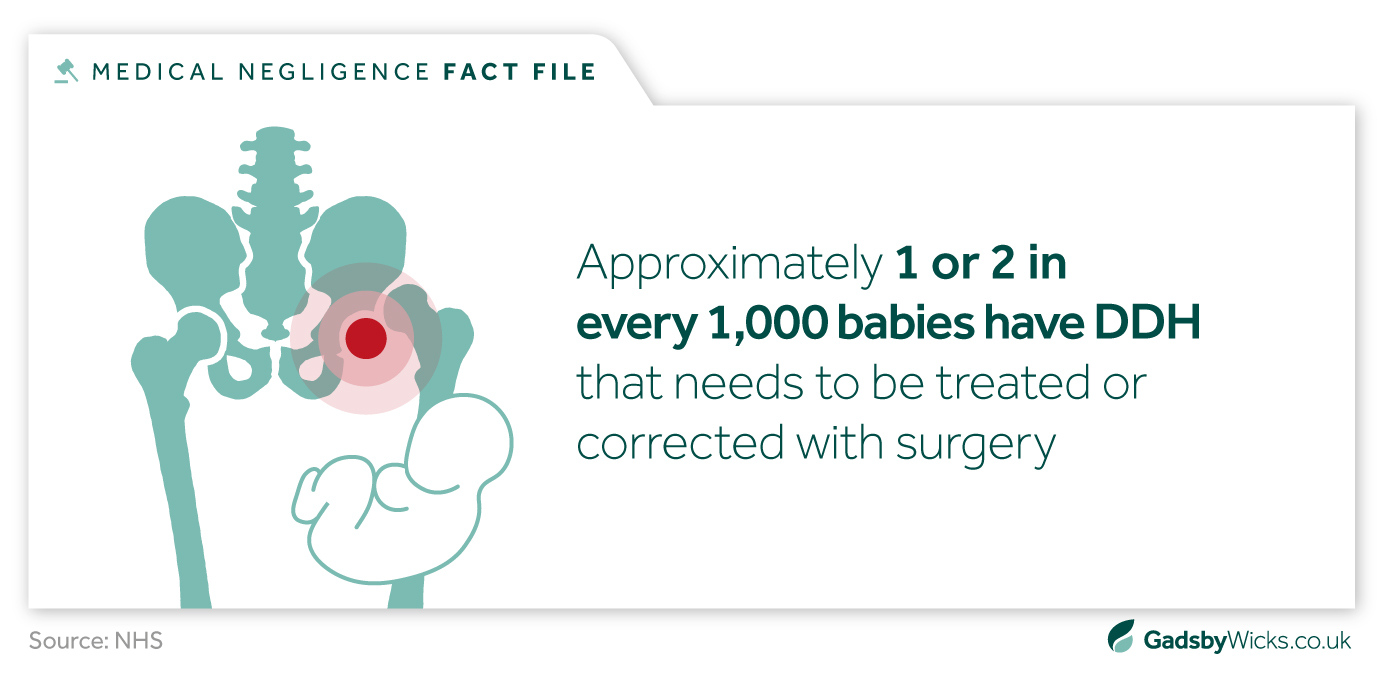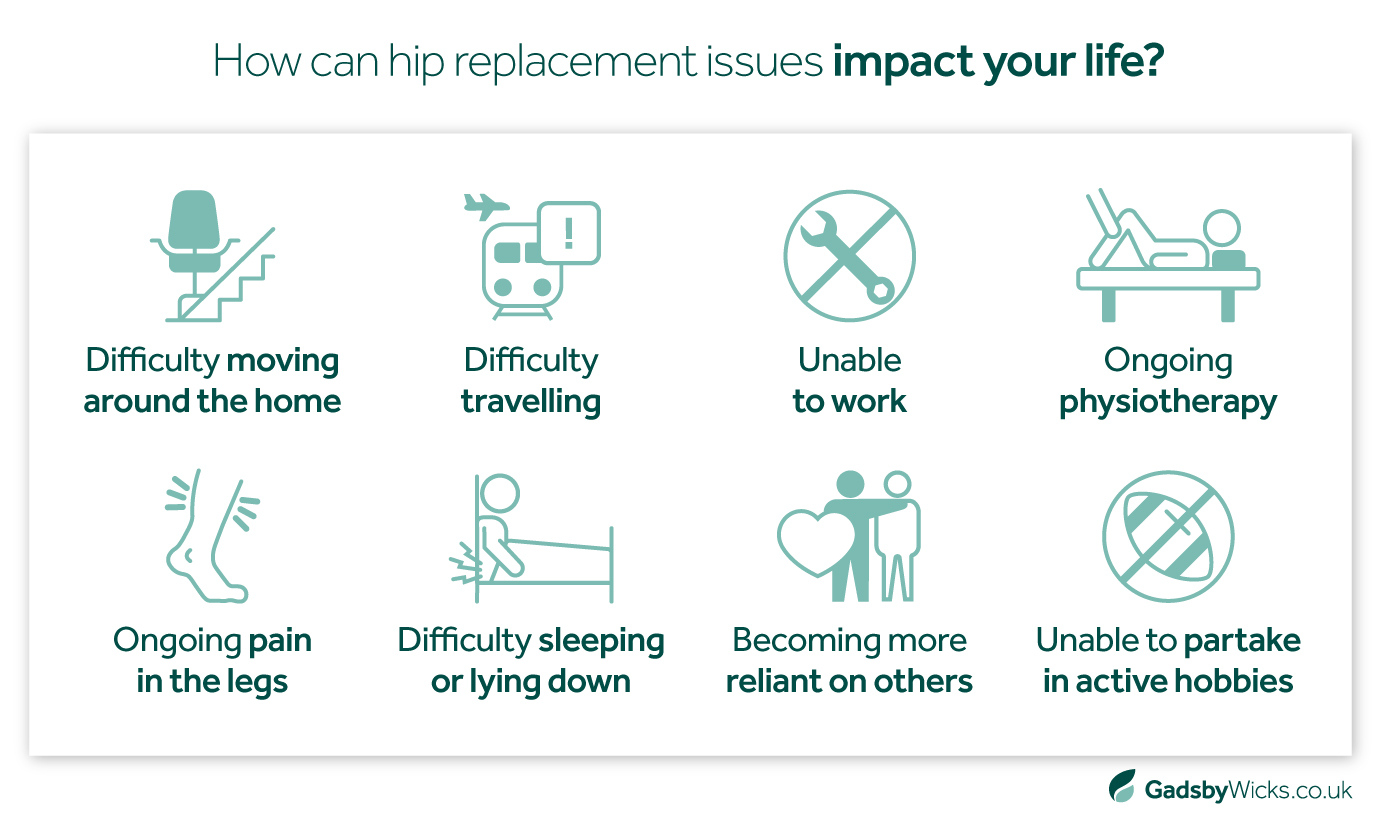- Home >
- Surgical Negligence Claims >
- Hip Surgery Claims
Nobody expects to experience more pain and discomfort after hip surgery than before it. But when complications arise, it can turn a routine procedure into a life-changing injury that robs you of your mobility, welfare, finances and more.
If this happened to you or someone you love, and you believe it was due to negligence by your surgeon, we are the team you can trust to manage your hip surgery claim. With over 30 years of specialist experience and an extensive track record, we fight for your right to justice and secure the compensation you need for today and tomorrow.

Do you have a hip surgery claim?
From failures in addressing bleeding to infecting new prosthetics, the fallout from substandard hip surgery can be devastating in both the short and long term.
Whether a surgeon selected the wrong size component, damaged peripheral nerves, or simply had a lapse in concentration. If you received negligent treatment, our trusted solicitors can guide you at every step of your hip surgery claim, ensuring your injuries are recognised, your questions are answered, and you receive the compensation you deserve.

The specialist hip surgery claims solicitors for Essex & East Anglia
Since 1993, we have won millions in compensation for claimants who have suffered the consequences of an inadequate hip operation – giving them the financial security and closure to turn the page on this challenging chapter.
Sharing decades of specialist expertise, you can rest assured your hip surgery claim will be handled meticulously and compassionately, with 96% of our cases settled outside the courtroom. Working on a ‘no win, no fee’ basis, working with us also gives you the comfort of knowing you will never pay anything unless your claim is successful.
What does our hip surgery claims process look like?

A free initial consultation
Call us, request a callback or complete our online form and we’ll assess if you have a valid medical negligence claim.

Funding your claim
Discover the ways we can fund your claim without you paying a penny at any stage of the process.

Investigating evidence
We gather medical records, witness statements and more to learn what happened to you and prove your claim.

Instructing independent medical experts
We work with impartial, experienced medical experts to establish whether your injuries were due to substandard medical care.

Valuing your claim
We assess your health and financial losses to accurately estimate how much compensation your claim is worth.

Presenting your case
We contact the Defendants and the Courts on your behalf to set out your allegations and receive a response.

Negotiating a settlement
We work to achieve a fair settlement for you outside the courtroom – this is how 96% of our cases end.

Preparing for Trial
If we must proceed to Trial, we fully prepare you for what to expect so you receive the right result in court.
FAQs about hip surgery claims
What is hip replacement medical negligence?
Though hip replacements are more common among older people, it has become commonplace for people as early as their 40s to have their first procedure. Most artificial hips last 15-20 years, then 10-15 years for each replacement.
As is the case with any surgical procedure, there is some inherent risk, which increases based on the patient's age and the number of revision surgeries performed. Most hip surgeries are performed with a good level of care and attention, causing no ill effects to patients in the short or long term.
But sadly, this is not always the case. A surgeon selecting the wrong size component or hip implant, or damaging peripheral nerves or blood vessels, can have serious ramifications for a patient’s health, mobility, finances, lifestyle and more.
What can cause hip surgery complications?
There is a limit to the number of times someone can undergo a hip replacement and achieve the desired outcome. Furthermore, the risk to the patient increases with each subsequent procedure – any mistake can have long-term consequences on how effective and long-lasting a replacement is.
Hip surgery negligence often involves the wrong size or type of prosthesis, or the prosthesis being fitted incorrectly. If the artificial component is not positioned correctly or securely, it can gradually become loose and unstable.
Over time this can cause significant pain and discomfort, impacting the affected person’s range of movement and stability. In severe cases, tissue damage may be caused if loose components break free and shatter, which could cause infection and permanent mobility problems.
It is also important that the surgeon ensures that there isn’t much difference between the length of each leg following surgery. If there is, this could lead to significant problems with mobility, gait and pain.
Other issues that can negatively affect the outcome of a hip replacement surgery include:
- Poor pre-operative assessment and monitoring
- Nerve damage caused during surgery
- Damage to tissues, cartilage, ligaments or veins
- Failure to address bleeding following the operation
- Infection to an open wound or transferred from a prosthetic
- Anaesthesia awareness
- Substandard follow-up care
If you or a loved one has suffered as a result of one or more of the above, we are here to help you secure compensation for the surgical errors you have endured.

How do we prove a hip surgery negligence claim?
As part of our investigations, we speak to an impartial, independent orthopaedic surgeon specialising in hip surgeries. This professional expertise helps us to determine:
- Whether your surgeon or another healthcare professional breached their duty of care towards you
- Whether your surgeon’s actions or inactions directly caused the pain and suffering you experienced
- How your circumstances have changed, and what support you need moving forward
This insight plays an essential role in establishing that your injuries were due to negligence, and quantifying the value of compensation you deserve. In addition, we will also assess all available evidence associated with your claim, including:
- Medical records
- Claimant statements
- Witness statements
- Complaint correspondence
What can hip replacement compensation pay for?
Compensation cannot take you back to before your hip replacement surgery. But, it can give you and your family the financial support you need to get back to the position you were in before your injuries. Or, where this is not possible, help make your future as comfortable and secure as possible.
The compensation you receive following a successful hip surgery claim can pay towards numerous requirements, including (but not limited to):
- Loss of earnings
- Adaptations to the home or vehicles
- Aids and equipment, such as wheelchairs and mobility scooters
- The salaries of care assistants
- Future procedures and corrective surgeries
- Physiotherapy, hydrotherapy and other ongoing therapies
- Psychological treatments and therapies
As experienced solicitors, we work hard to ensure that every orthopaedic surgery compensation claim we pursue achieves a successful outcome for our claimants.
How long do hip replacement surgery claims typically take to settle?
It is impossible to accurately predict how long a hip surgery claim will take to settle at the outset. Each case is unique and the time to resolution can be affected by a variety of factors, including:
- Whether the Defendants admit to negligence immediately or not
- How long it takes to receive feedback from medical experts
However, in our experience, most hip surgery claims will settle between two and five years, similar to joint surgery and knee surgery claim.
How long do I have to make a hip surgery compensation claim?
In most cases, a hip surgery claim must be made within three years of the injury being realised. However, there are exceptions to this rule:
- Children making a claim have until their 21st birthday
- There is no time limit for anyone who is mentally incapacitated
- If the claimant passes away within the three-year window, the three years start again from the date of death
Furthermore, the court does have the discretion to allow a claim to be brought out of time. Get in touch with us and we can discuss your specific circumstances.

Contact our expert hip surgery claims solicitors
If you or a loved one have experienced an injury during hip surgery and would like to speak to someone about your options, our team is here to listen and advise you on your next steps.

Lexcel accredited medical negligence claims solicitors
We are proud to be a Lexcel-accredited practice. The accreditation is a mark of quality and comes directly from the Law Society.
A recent assessment described us as a “Centre of Excellence” and we continue to operate to the highest standards across all main areas of our field. These include client care, case management, financial management, structure and strategy, people management, risk management, information management and file management.








